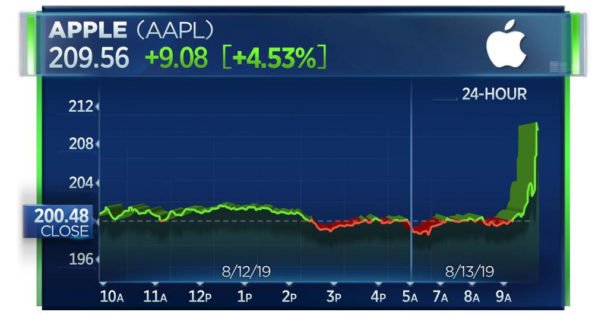Apple Stock Plunges Amid Tariff Fears

Apple (AAPL) stock experienced a significant drop of over 8% on April 2nd, following President Trump's announcement of sweeping reciprocal tariffs. This latest downturn adds to Apple's already challenging year, with shares down more than 17% year-to-date. The decline is attributed to concerns about slowing iPhone sales and broader investor risk aversion, exacerbated by the unexpected magnitude and scope of the new tariffs.
UBS Global Research strategist Bhanu Baweja noted that the tariffs were larger than anticipated, posing an "added shock" with the potential to negatively impact both domestic and global economic growth. Morgan Stanley analyst Erik Woodring highlighted Apple's reliance on international manufacturing, primarily in Southeast Asia, making it particularly vulnerable. He estimated potential added tariff costs exceeding $38 billion annually, representing roughly 26% of Apple's projected 2026 earnings before interest and taxes (EBIT). Woodring also predicted that the heightened uncertainty could lengthen sales cycles.
While concerns are high, analyst sentiment remains mixed. CFRA Research analyst Angelo Zino, while lowering his price target from $270 to $235, acknowledged Apple's strong free cash flow and balance sheet, and the mitigating effect of its growing Services division, which contributed 21% of total revenue in the most recent quarter. Zino cited potential downside to margins and earnings if the tariffs remain in place, and also noted the risk of further retaliation from countries like China. Despite these worries, a consensus among 45 analysts tracked by S&P Global Market Intelligence still rates AAPL as a Buy, although with less conviction than earlier this year.
Meanwhile, a Schwab Network commentator, Tom White, adopted a bearish short-term outlook, citing Apple's significant tariff exposure and the limited success of its AI initiatives. He suggested a specific options trading strategy. Conversely, another commentator, James Demmert, remained bullish on the market, emphasizing the continued strength of the AI-driven bull market and improved price-earnings ratios. He argued that companies could maintain margins despite tariffs. However, even acknowledging Apple's potential, Demmert highlighted other AI stocks as offering greater potential for quicker returns.
Despite the current market volatility, the long-term outlook for Apple remains a subject of debate amongst analysts, with some emphasizing its inherent strengths while others remain cautious in the face of significant economic headwinds.









